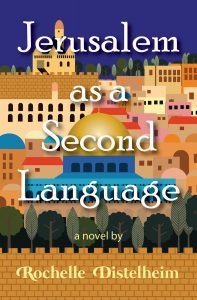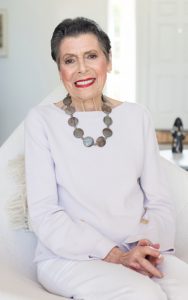Jerusalem as a Second Language, by Rochelle Distelheim: Excerpt
 While her father was raised as an Orthodox Jew, Rochelle’s mother saw her Judaism as interesting, but not necessary. “She loved the music, the food, the heavy devotion to education and family,” Rochelle explains. “As a fallout, I knew I would never marry out of the religion, but my husband and I were contented High Holiday Jews.” They loved Israel and its dazzling accomplishments and visited often. During a trip in the 1990s, they quickly learned that all of the Russian they heard was a result of a large wave of Jewish immigrants who arrived in Israel after the fall of the Soviet Union. Rochelle was intrigued by the two extremely different cultures, yet enormously similar temperaments. A seed for a novel was planted. She could explore a marriage in which one partner was Orthodox and one secular. “Enter Manya and Yuri. I knew her, I had to discover him.”
While her father was raised as an Orthodox Jew, Rochelle’s mother saw her Judaism as interesting, but not necessary. “She loved the music, the food, the heavy devotion to education and family,” Rochelle explains. “As a fallout, I knew I would never marry out of the religion, but my husband and I were contented High Holiday Jews.” They loved Israel and its dazzling accomplishments and visited often. During a trip in the 1990s, they quickly learned that all of the Russian they heard was a result of a large wave of Jewish immigrants who arrived in Israel after the fall of the Soviet Union. Rochelle was intrigued by the two extremely different cultures, yet enormously similar temperaments. A seed for a novel was planted. She could explore a marriage in which one partner was Orthodox and one secular. “Enter Manya and Yuri. I knew her, I had to discover him.”
JERUSALEM AS A SECOND LANGUAGE
It’s 1998. The old Soviet Union is dead, the new Russia is awash in corruption and despair. Manya and Yuri Zalinikov, secular Jews – he, a gifted mathematician recently dismissed from the Academy, she, a concert pianist — sell black market electronics in a market stall, until threatened with a gun by a Mafioso in search of protection money. Yuri sinks into a Chekhovian melancholy, emerging to announce that he wants to “live as a Jew” in Israel. Manya and their daughter, Galina, are desolate, asking “how does one do that,” and “why?”
Thus begins their odyssey, part tragedy, part comedy but always surprising. Struggling against loneliness, language, and danger, Yuri finds a Talmudic teacher equally addicted to religion and luxury; Manya finds a job playing the piano at The White Nights supper club, owned by a wealthy, flamboyant Russian with a murky history, who offers lust disguised as love. Galina, enrolled at Hebrew University, finds dance clubs and pizza emporiums and a string of young men, one of whom Manya hopes will save her from the Israeli army by marrying her.
Against a potpourri of marriage wigs, matchmaking television shows, disastrous investment schemes, and a suicide bombing, JERUSALEM AS A SECOND LANGUAGE confronts the thin line between religious faith and skepticism.
We are delighted to share this excerpt!
From Jerusalem as a Second Language, by Rochelle Distelheim: chapter twenty-three, pages 240-243
Here, now, the bitter coincidence in my story. In this city of half a million persons, and an equal number of [sidewalk] cafés, on that afternoon, at a table some meters beyond ours, but close enough for me to observe, sat a slender man with an ordinary face, not young, not old, wearing one of those stiff black hats that sit unnatural, high on the head, a black silk coat, the white fringe of his tzitzit swinging below his shirt. The tzitzit I did not see until he stood up; but, seeing the hat, seeing the beard, I knew this was a case of tzitzit.
The beard: heavy, dark, not trimmed to a point and romantic-looking, like Yuri’s, or even like Czar Nicolas’s beard, but dense and squared and long. His side curls bounced in a manner that was both comic and serious, and were, in a strange way, sweet-looking when he turned his head to call the waitress. All in all, an ordinary, Orthodox look in a place where this man was among his own.
And, yet, something. I whispered to Yuri, “Isn’t that man too young to look so old?” He frowned, and whispered back, “Manya, please.”
Since his departure from our family’s nonexistent Judaism, Manya, please, had become his principal declaration to me when I remarked in public upon anyone in black clothing. Or, in private, on why the monthly necessity of the mikvah insulted women. Or, on why refusing to eat milk products and meat products together was accepting the medieval amidst the twentieth century.
“That man is fully Israeli,” he said. This was what Yuri called the person of whom I speak. Fully Israeli. The eye twitch danced in the corner of his right eye, further proof, not that I needed it, of his annoyance with me.
I leaned past Yuri, hoping to reach Galina. Still writing, absorbed fully in her notebook, she undoubtedly hadn’t noticed this man. She ignored all men in black. They were beyond her ability to understand, she’d said, primitives, unfriendly to women, why should she acknowledge them?
Why? Because they were here, and we were here, and every molecule occupying a single Israeli could change the emotional temperature of this country. Just as the beggars lingering at the entrance to the central post office in St. Petersburg changed the way we entered and exited from that building, making certain to have coins to drop into their hands, or suffer their insults hollered after us as we retreated down the street. Just as the babushkas seated in the corners of every gallery in the Hermitage Museum changed the way we’d enjoyed the art. Do not touch, do not stand too close, do not sneeze, cough, sniff on any object other than another person.
The man was now wearing sunglasses while reading his newspaper, shifting the paper every few moments, reading it upside down as often as right side up. Strange, but most Israelis’ nerves were so jangled by everyday events, reading a paper upside down might be a typical consequence of this. Should I report him, like I’d report a suspicious package sitting in the post office, looking like it belonged to nobody? Report him for doing what? This man was not a package; he was an Orthodox.
I looked around for someone whose arm I might grab, someone to whom I could whisper, Shhh, there, that man in black, does he look wrong to you? Would an Israeli believe a Russian? Remember the people at the Dung Gate, I reminded myself; stay calm, talk calm. Yuri fussed with his wristwatch, shaking it to assure that the time was correct, and Ahuva reminded the Reb to put only one sugar in his coffee, and Jen asked, Where was the bathroom? I said, me, too. Jen was the one. If my Hebrew could penetrate her Hebrew, she’d believe.
. . . . . . . . . . . . . . . . . . . . . . . . . .
We walked together to the café building, not ten meters from our table, passing the man in black, who had a look of happy expectation on his face, or what I could see of his face, with all that beard to hide in. Jen went inside, but I stopped at the entrance to look back at him. He stood up. I thought, good, he’s leaving. But no. He didn’t walk away.
I stayed in the doorway, just inside the café, holding the door open to see what he’d do next. He called out to the waitress, “Please, a glass of water.” In this same moment, a small bird with a shimmering blue head flew onto the tip of the umbrella shading his table. The waitress, a slender young girl with pale, silky curls all over her head, a starched white apron over her blue jeans and T-shirt, and a springy walk that announced good health, brought the water. To look at her was to know that somewhere, even if they lived in a faraway time zone, was a family that telephoned her often, just to inquire about her happiness, and to say, “Good night, we love you.”
I continued holding the door open. The bird was pecking at the yellow umbrella as though someone had planted it with bird seed. The man drank the water, dropping the glass, or throwing it, a crash that caught everyone’s attention, except the bird’s. Then he said, very loud, to no one, to everyone, in Hebrew more poorly accented than even mine, “Goodbye! I will not see you again,” before thrusting one hand inside his jacket and throwing himself forward.
—
 ABOUT THE AUTHOR:
ABOUT THE AUTHOR:
Rochelle Distelheim (1928-2020), a Chicago native, earned numerous short story literary awards, including The Katherine Anne Porter Prize; Illinois Arts Council Literary Awards and Fellowships; The Ragdale Foundation Fellowships; The Faulkner Society Gold Medal in Novel-in-Progress; The Faulkner Society Gold Medal in Novel; The Gival Press 2017 Short Story Competition; Finalist, Glimmer Train’s Emerging Writers; and The Salamander Second Prize in Short Story. In addition, Rochelle’s short stories earned nominations for The Best American Short Stories and The Pushcart Prize. Her stories appeared in national magazines such as Glamour, Good Housekeeping, Ladies Home Journal, Woman’s Day, Woman’s World, Working Woman, Working Mother, and more. Her first novel, Sadie in Love, was published in 2018 when she was 90 years old.
Category: Contemporary Women Writers, On Writing























